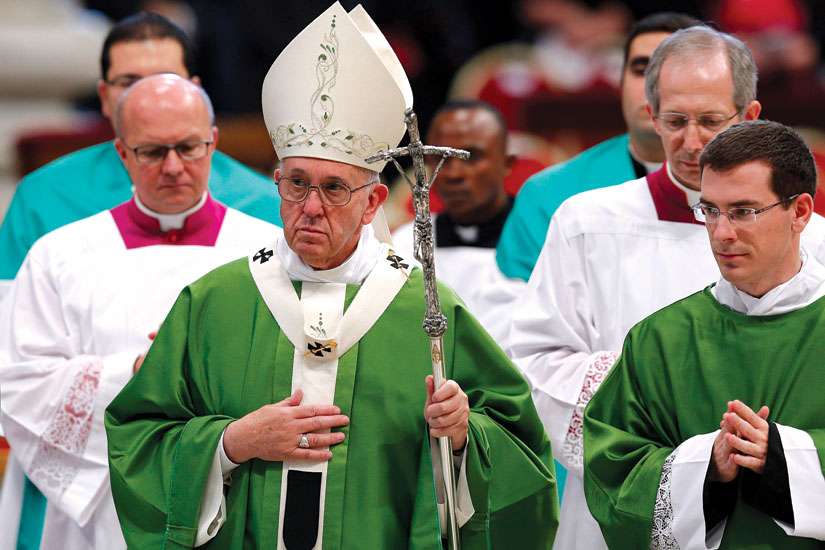Over the past 50 years Synods have become a permanent and essential part of how the Church governs and understands itself. So whatever other accomplishments may be attributed to the most recent three weeks of debate, perhaps the most significant achievement has been to reinforce in the minds of Catholics the idea that this “walking together” is how the Church relates to itself and to the world.
Without a doubt, much of this Synod was focused on the contentious issues of communion for remarried Catholics as well as various kinds of non-traditional families — cohabiting, unmarried couples, gay couples, single parents.
The Synod recommended an increased role for conscience and a specific role for pastors in guiding couples remarried outside the Church. Synod fathers suggested that, on a case-by-case basis, pastors could discern together with couples a possible path back to Communion. It’s an approach that de-emphasizes blanket application of Church law and recognizes the personal faith journey of sinful, fallible people.
Similarly, on irregular families, the Synod urged listening: “Sometimes it is necessary to stay by their side and listen in silence; other times it must indicate the path to follow; and at still other times, it is opportune to follow, support and encourage,” said the Synod fathers. But on gay marriage, the Synod fathers rejected any form of gay coupledom as equivalent to marriage.
All of this is only advice to Pope Francis. He has not committed to a timetable for producing an apostolic exhortation on the Synod topics. And it would be a mistake to imagine that the only possible fruit of the Synod would be another document. In fact, Pope Francis has already acted on the Synod debate by reorganizing Vatican departments dedicated to the laity.
It will be up to Francis how he accepts the Synod fathers’ advice. It’s his take on Synod debate that counts.
“The Synod was not about settling all the issues,” Francis told the delegates on the last day. “But rather attempting to see them in the light of the Gospel.”
Nor was the Synod an exercise in rote repetition of catechism, in the Pope’s eyes. Over three weeks of unscripted discussion, delegates were “bringing the joy of hope without falling into a facile repetition of what is obvious or has already been said,” said the Pope.
In his final address, he again expressed his disdain for laws and doctrinal formulas that are used to close down discussion.
“It was about listening to and making heard the voices of the families and the Church pastors,” he said. “It was also about laying bare the closed hearts which frequently hide even behind the Church’s teaching or good intentions… It was about trying to open up broader horizons, rising above conspiracy theories and blinkered viewpoints, so as to defend and spread the freedom of the children of God, and to transmit the beauty of Christian newness, at times encrusted in a language which is archaic or simply incomprehensible.”
Important issues received less media ink and Synod time than the hot-button, culture war anguish over same-sex relationships and second marriages outside the Church. Archbishop Paul-André Durocher stirred debate about violence against women and the place women occupy in the official structures of the Church.
The Synod unfolded against a background of a mass exodus of families — Christian, Muslim and others — from Syria. But the families trudging out of Syria are only the most dramatic and obvious example of a massive crisis for families. Whether it’s poverty or men with guns, millions of families are torn apart, forced to flee and robbed of hope because they cannot live in peace and security. Synod fathers recognized this, but found it difficult to propose how the Church can meaningfully help these families.
After the Synod concluded, the Pope preached a Sunday Mass, meditating on the story of blind Bartemaeus that was read in Catholic parishes world-wide.
“A faith that does not know how to root itself in the life of people remains arid and rather than oases it creates other deserts,” he said.
For Pope Francis, the Synod is not aimless meandering together. It is walking together with purpose toward those oases.


